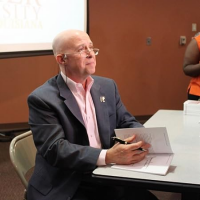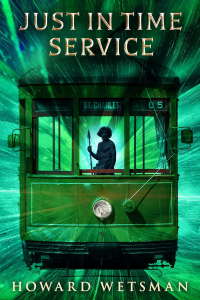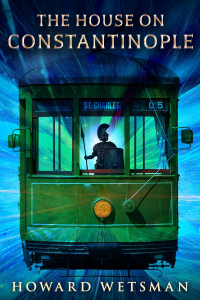Howard Wetsman Interview Published on: 10, Oct 2024
 Can you tell us about your journey from being a Navy veteran and physician to becoming a writer?
Can you tell us about your journey from being a Navy veteran and physician to becoming a writer?
My journey as a writer started in High School, but I was afraid I wasn’t good enough to produce fiction that others would want to read. It was the 1970’s and a time of economic uncertainty in the US. Writing felt like it needed to be something I liked doing in my spare time rather than something I could make a living at.
In college, I found that a career in Medicine was possible and I applied to medical school. Medical education not being inexpensive, I also joined the Navy for their scholarship program. In both the Navy and in Medicine, my writing became more and more transactional. Both communities write only to exchange information, and so much of what transports us in fiction is lost. I found it harder and harder to write the stories that bubbled up in my mind.
Now, I’m retired and am feeling that part of my brain resurface, only with even more stories gathered from those years.
What inspired you to start writing about time travel?Science Fiction, and particularly time travel, has always been my favorite genre to read. Creating new worlds, SciFi authors give us an opportunity to look at our own lives in new ways from new perspectives. It doesn’t hurt that I grew up in a city that seems to have traveled in time.
How has living in New Orleans influenced your writing?While everything is just a moment in time, New Orleans stands out as a place that continually reminds us of that. As one of the oldest places in the US, you can see history just walking down the street. The city’s history of life-altering floods, both from the river before levees and, more recently, Hurricane Katrina, provides a daily reminder that this is the only moment we have. The constant of our lives is that time moves only in one direction. I think it is humanity’s greatest wish to change that, which makes time travel stories so interesting to us.
Can you share a bit about your writing process and how you come up with your story ideas?Story ideas come out of the blue. For instance, in the current series, Just in Time, the original idea was a frustrated policeman who suddenly found himself able to travel in time. That new power gave him the ability to right some of what he was frustrated by in the force. By the time I got around to writing the book, it became clear that there was more to the story. Now, that character doesn’t really show up until the first pages of Book Three.
What historical periods or events do you find most fascinating, and why?That’s like asking which is my favorite child. I find all of history fascinating and I love to imagine what my own thinking would be like if I’d never heard of relativity, atoms, oxygen, or DNA. We take this knowledge for granted in our lives and think we’re so intelligent for having it. The ancients were just as smart. I also love to think about what could they had done if they’d known what we know.
How did you balance historical accuracy with creative freedom in your time travel novel, “Just in Time Service”?I try as best as I can to make sure what the characters do is consistent with what we know to have happened. But so much of history was written not to record facts but to explain outcomes that it’s hard to know what really happened. As that theme repeats, there are some occasions for taking liberties to make that point.
What challenges did you face transitioning from a medical career to a writing career?I found while I was writing medically, I couldn’t produce long-form fiction. The best I could manage was a few short stories and those took years to write. The demands of medical writing pull from a completely different part of my brain, and that’s a good thing. You certainly don’t want doctors running around making stuff up!
Are there any specific authors or books that have significantly influenced your writing style or themes?Oh so many. I’m glancing over at the bookshelf to get a few names: Heinlein, Stephenson, Turtledove, McDevitt, Birmingham. I don’t want to leave anyone out, but I just left out loads of favorites. We are blessed to have so many wonderful storytellers alive right now.
Can you tell us more about your favorite aspects of time travel as a genre?It gives us worlds without limits, worlds we can design to tell the specific story we’re trying to relate. Time travel can lead us to other planets or just back home to meet our parents when they were teens. Whatever the theme, we can find a way to tell it with time travel.
What do you hope readers take away from your books?That we have limits, but those limits are based on assumptions that may not be true. Or that they may only be true at this time. We love to think we know everything, but everyone before us did as well. When we look at those who lived a long time ago, put yourself in their shoes and ask, would you, could you, have really done it better knowing only what they knew? I think if we want to have compassion for ourselves, we need to have compassion for those who came before us. And if we can’t find compassion for ourselves, we’re on the fast track to self-destruction.
How do you think your medical background has influenced your writing, if at all?How could it not have? After this series, the next book will be partly about an alcoholic psychiatrist living in New Orleans. I wonder where I got that idea from. Haha.
What are some of the biggest lessons you've learned throughout your varied career paths?There is a common tendency among humans to put limits on others and then blame those others for the consequences of the limits. We almost never look at ourselves. I think the most important thing I’ve learned is that our problems are of our own making. When we see fault in others, we should go look in a mirror.
Can you share any memorable experiences or stories from your time in the Navy?Yes I can, but I’ll hold on to them a little while longer. There’s a book percolating around in there.
What projects are you currently working on, and what can readers expect from you in the future?Currently, I’m working on Just in Time Deliverance, which will finish out that series. After that, the book about the psychiatrist I mentioned earlier. Then there’s a time story with aliens floating around in there. And I have a book idea for my time on a ship in the Navy, but I’m not sure if that’s going to be a comedy or not. Some stories are so fraught that they can only be told with laughter.
How did you first come across the AllAuthor website? What do you like or dislike about the site?I think it was the excellent services for new authors that first attracted me. I like how it takes some of the work off of me for doing things that aren’t writing. I don’t want to be in the book promotion business or the book reviewing business. I want to write and I appreciate anything that frees me up to do that.
Howard Wetsman is a Navy veteran and retired physician living on the Mardi Gras parade route in New Orleans with his wife. When he's not writing captivating tales of time travel, he enjoys diving into history and contemplating the future.



